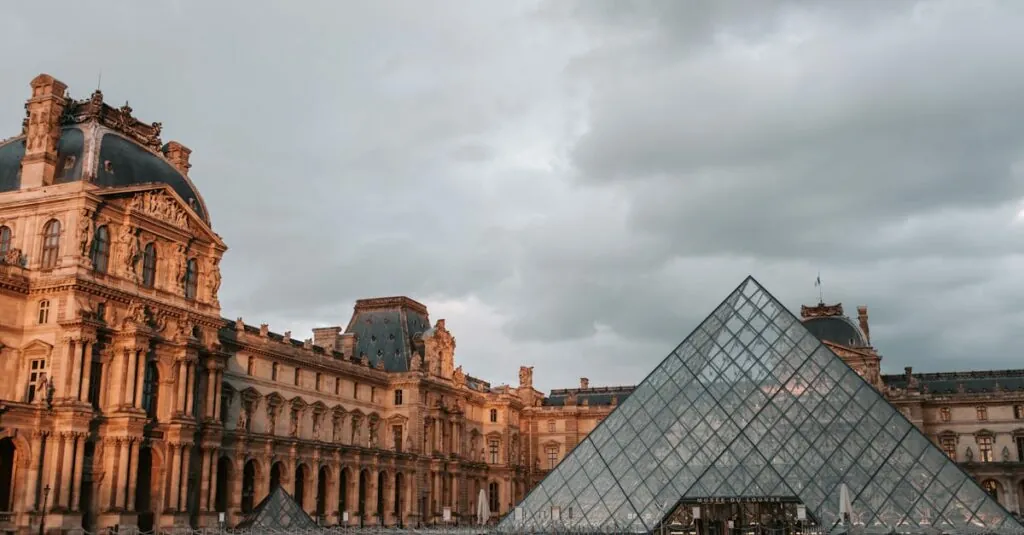Table of Contents
ToggleWhen it comes to culture, France is like that charming friend who always knows the best restaurants and has a flair for the dramatic. From the art of fine dining to the elegance of fashion, French culture is a delightful tapestry woven with history, passion, and a touch of je ne sais quoi.
Overview of French Culture
French culture encompasses a diverse array of traditions, customs, and artistic expressions. Art plays a vital role, with France being home to renowned movements such as Impressionism. Famous artists like Claude Monet and Edgar Degas impacted the artistic world significantly.
Cuisine serves not only as sustenance but as an integral part of daily life. French gastronomy emphasizes freshness and quality, with iconic dishes like coq au vin and ratatouille showcasing regional ingredients. Celebrated culinary school Le Cordon Bleu trains chefs globally, promoting French techniques.
Fashion embodies refinement and innovation. Paris stands as a global fashion capital, hosting events such as Paris Fashion Week. Influential designers such as Coco Chanel and Christian Dior have left lasting legacies, emphasizing elegance in both haute couture and ready-to-wear collections.
Literature thrives in French culture, with iconic authors like Victor Hugo and Marcel Proust shaping literary history. French philosophers such as Jean-Paul Sartre and Simone de Beauvoir contributed to existentialism, influencing modern thought and discourse.
Festivals celebrate the richness of French culture. Events like Bastille Day on July 14 commemorate historic events and feature fireworks, parades, and music. Local traditions vary across regions, reflecting the diverse heritage of the French people.
Language also holds a special place in French identity. The French language is known for its beauty and complexity. It serves as a means of expressing cultural values and enhancing communication.
Music enriches the cultural landscape as well. Genres such as chanson and electronic music have gained international attention, with artists like Édith Piaf and Daft Punk achieving global acclaim. Traditional music can vary by region, showcasing the country’s rich musical heritage.
Historical Influences on French Culture
French culture has deep roots shaped by numerous historical events and influential figures. These elements have crafted a distinctive identity recognized worldwide.
Key Historical Events
The French Revolution (1789-1799) significantly transformed societal structures, emphasizing liberty and fraternity. This pivotal event inspired cultural movements and established modern democracy. The Napoleonic era (1804-1815) furthered French influence, exporting legal systems and educational reforms to various nations. World War I (1914-1918) impacted arts, inspiring movements like Surrealism, reflecting the collective trauma experienced. Following World War II, France underwent a cultural renaissance, leading to the growth of existentialism which prompted new philosophical thoughts.
Impact of Notable Figures
René Descartes laid the groundwork for modern philosophy with his emphasis on rationalism, significantly shaping intellectual thought. Louis XIV, the Sun King, established French art and architecture’s prominence by fostering a culture of elegance and grandeur. Voltaire championed freedom of speech and religious tolerance, influencing literature and political ideas. Coco Chanel revolutionized fashion, introducing modern styles that elevated women’s clothing. Lastly, artists like Claude Monet contributed to Impressionism, reshaping perceptions of beauty through innovative techniques.
Language and Communication
Language plays a crucial role in French culture. French is not just a means of communication; it embodies the nation’s heritage and identity. The language is known for its beauty and complexity. In everyday life, it provides a framework for social interaction and creativity.
The Importance of the French Language
The French language connects people to their culture, history, and traditions. Many view it as a key to understanding French philosophy and literature. Proficiency in French opens doors to diverse opportunities in art, business, and travel. France promotes its language globally through organizations like the Alliance Française. The country’s dedication to linguistic preservation reinforces the importance of French as a tool for cultural diplomacy.
Common Phrases and Expressions
Familiarity with common French phrases enriches interactions and enhances cultural experiences. “Bonjour” serves as a standard greeting, conveying warmth. “Merci” expresses gratitude, reflecting the polite nature of French society. Understanding phrases like “s’il vous plaît” fosters respect in conversations. “Ça va?” allows for casual inquiries about well-being. Engaging with these expressions creates connections and demonstrates appreciation for the language, ultimately deepening one’s cultural immersion.
Art and Literature
French culture shines through its art and literature, showcasing deep-rooted traditions and creative expressions. Masterpieces created in these realms have shaped global perspectives.
Famous French Artists and Authors
Claude Monet stands out as a pivotal figure in Impressionism. His use of light and color transformed perception in art. Edgar Degas, another significant artist, captured movement through ballet and everyday life in bold strokes. In literature, Victor Hugo’s compelling narratives explore humanity and society, while Marcel Proust’s introspection delves into memory and existence. Renowned philosophers, including Jean-Paul Sartre and Simone de Beauvoir, contributed significantly to existential thought and feminist theory, respectively.
Contribution to Global Art Movements
France has forged various influential art movements that resonate worldwide. Impressionism brought a revolutionary approach to capturing light and fleeting moments, inspiring artists across the globe. Surrealism emerged as a response to the chaos of war, leading to dream-like and imaginative explorations in art and literature. These movements, nurtured by French artists, have permeated cultures, encouraging experimentation and innovation. Their legacies continue to inspire contemporary creators, highlighting France’s role as a hub of artistic development.
Cuisine and Culinary Traditions
French cuisine stands out for its diversity and emphasis on quality ingredients. The focus on regional specialties reflects the unique character of various areas in France.
Iconic French Dishes
Classic dishes such as coq au vin, ratatouille, and bouillabaisse exemplify this culinary tradition. Coq au vin features chicken braised in wine, often served with mushrooms and lardons. Ratatouille showcases summer vegetables like eggplant and zucchini, reflecting Provençal flavors. Bouillabaisse, a traditional fish stew from Marseille, highlights the Mediterranean’s bounty. Each dish embodies both local ingredients and history, showcasing a rich gastronomic heritage.
Role of Food in French Society
Food holds a pivotal role in French society, serving as a unifier among family and friends. Meals are often lengthy affairs that encourage conversation and connection. Celebrations frequently revolve around food, with festive gatherings highlighting traditional dishes. Culinary education in France emphasizes the importance of cooking techniques and presentation, ensuring a high standard in restaurants and home kitchens alike. Social interactions within the context of dining reflect the French commitment to savoring experiences, making mealtime a cherished tradition.
Fashion and Lifestyle
Fashion in France represents a blend of tradition and modernity, shaping lifestyles around the world. Renowned for its elegance, French fashion consistently influences daily attire and special events.
Milestones in French Fashion
French fashion history features iconic milestones that define its evolution. The mid-19th century saw the establishment of the first fashion houses, such as Charles Frederick Worth’s Parisian salon, which revolutionized ready-to-wear. Later, the 1920s brought about the flapper style, led by designers like Gabrielle “Coco” Chanel, who introduced casual chic to women’s clothing. The 1950s marked a pivotal moment with Christian Dior’s “New Look,” celebrating feminine silhouettes that enhanced the waistline. Such events illustrate France’s role as a fashion leader, continually setting standards in design and craftsmanship.
Influence on Global Trends
French fashion influences global trends through its emphasis on sophistication and quality. Designers regularly impact styles beyond France’s borders, with luxury brands like Louis Vuitton and Chanel becoming symbols of high fashion worldwide. Fashion weeks in Paris attract international attention, showcasing innovative designs and emerging talent. Trends like minimalist aesthetics and streetwear styles often originate from French runways. While emphasizing individual expression, these global trends enhance the understanding of fashion as an art form, demonstrating France’s critical role in shaping contemporary wardrobes across cultures.
French culture stands as a vibrant tapestry woven from history art cuisine and fashion. Its elegance and charm resonate through its traditions and customs that continue to inspire people around the world. From the breathtaking masterpieces of Impressionism to the culinary delights that define French gastronomy each aspect reveals a deep appreciation for quality and creativity.
The influence of French literature and philosophy has shaped modern thought while the global impact of its fashion industry showcases a commitment to innovation and style. Engaging with French culture offers a unique opportunity to explore a world rich in heritage and expression inviting everyone to savor the beauty of this captivating nation.




